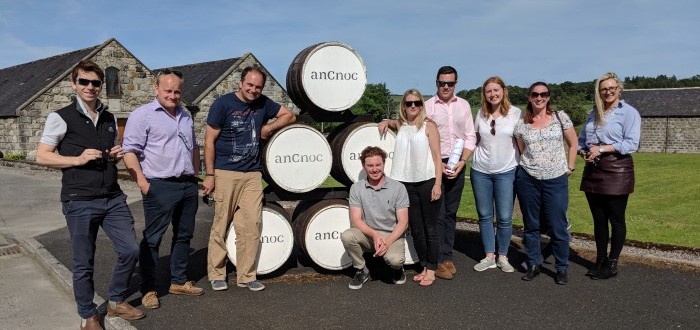NPA recently took a small group of Young NPA members to Scotland for what turned out to be an informative and fun couple of days. The main purpose of our visit was to see one of Karro Food Group’s outdoor breeding units, but we managed to squeeze in a few other activities while were there, writes Georgina Crayford.
We headed to Oldmeldrum, Aberdeenshire, for a tour of a cold oil processing plant owned by Norvite, an animal nutrition company. We watched the oil pressing process, where oil is extracted from rapeseed, for use in pig and poultry feed.
Next up was the office of the pig marketing cooperative Scottish Pig Producers, for an overview of Scotland’s pig industry. There are around 40,000 sows in Scotland, with farms mainly situated along the east coast. Breeding units tend to be located higher up the country with progeny coming down for finishing, including into England.
We heard how Scotland is only 25% self-sufficient in pork, suggesting there are big opportunities to be had, especially if processing facilities can be improved and marketing boosted.
Having finished discussing the new Scottish Pig Sector Strategy, the trials of the Brechin plant since opening in 2016 and comprehensive plans to improve Scottish pig health, it was time to sample the country’s most famous export… whisky!
A tour of the Knockdhu Distillery left us with a much better understanding of the processes involved in whisky production. And, of course, we were pleased to try some of the finished product.
In the evening we had some interesting presentations from Karro and Devenish Nutrition, which set the scene nicely for our visit the following day to one of Karro’s new outdoor breeding units in Elgin. Karro owns an increasing proportion of the sows in Scotland, under the Brydock Farms name, producing outdoor-bred pigs raised without antibiotics and with no tail docking or teeth clipping.
The pigs didn’t seem fazed by the unusually hot weather. They had plenty of places to cool down, in wallows, under shades erected in the paddocks or in the insulated farrowing huts.
It was great to hear about Karro’s ongoing developments on the pig production side of the business.
There is a clear commitment to invest in the farms and staff, which has resulted in fantastic staff retention and contributed to the overall success of the farms. There is also considerable investment
in trials and projects to improve the use of data and drive further innovation, efficiency and improved pork quality. The key seems to be attention to detail and consistency in best practice at every stage of production, rather than reliance on a perceived silver bullet.
Huge thanks to Karro (particularly Nick Davies) for hosting us and sponsoring our dinner and drinks, along with Devenish. We must also thank MS Schippers for providing the disposable overalls and boot covers for the farm visit, and Alasdair Brodie at Norvite and Andy McGowan at SPP for welcoming us, too.
PUSHING BREEDING AND GENETICS UP THE BREXIT AGENDA
Many NPA members have become accustomed to me discussing what Brexit means for the trade in pork products, the labour market and for future national biosecurity capabilities, writes Ed Barker. However, it is also important to note the impact that Brexit could have on the trade in breeding pigs and breeding material both to and from the UK.
At the start of the year, we at the NPA became concerned that while Defra and other departments had a good understanding of the possible food-related concerns of Brexit (trade flows, tariffs etc), the issue of breeding stock has been severely under-represented.
With that in mind, the NPA arranged a meeting between a suite of Defra civil servants, and the heads of UK pig breeding companies, including the BPA, back in February, to help ensure Defra is better informed of what the breeding sector sees as a good, or bad, Brexit deal, as well as explaining how these scenarios could affect UK pig producers.
Discussions have covered the current EU trade dynamic, the impact of a ‘hard’ Brexit, difficulties of the current system, threats and opportunities from new trading relationships, zootech regulations, live breeding animal exports and imports, national herd health and border controls. In essence, it was all about getting breeding and genetics up the agenda.
So successful was this meeting that on June 28, the NPA spearheaded a cross-livestock breeding companies meeting with Defra. We are expecting further meetings with Defra in the autumn, and it is more than likely that this will be a more regular occurrence.




